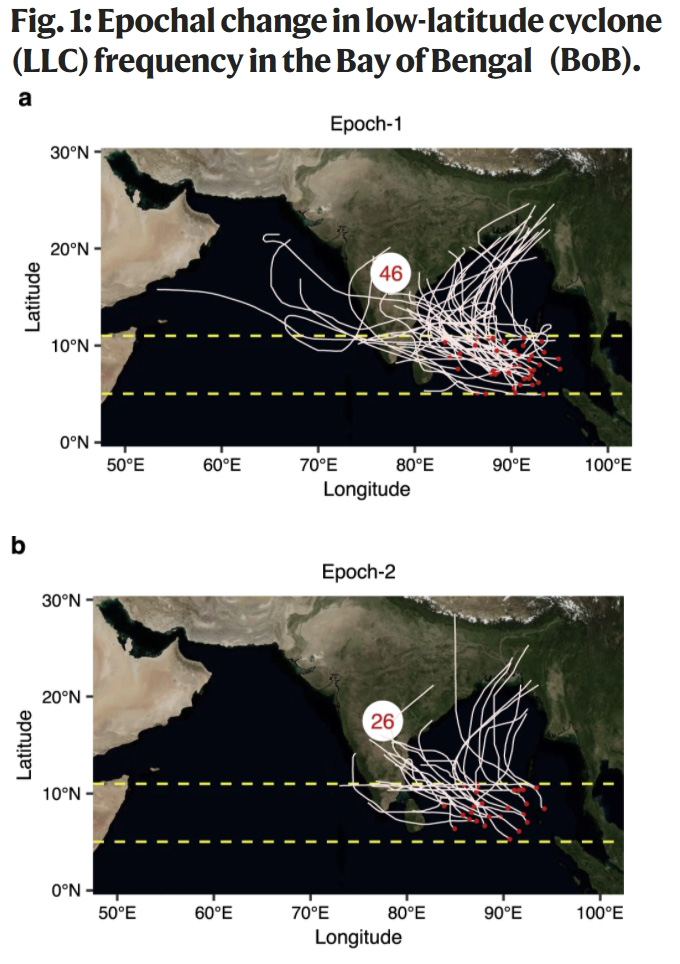43% fewer cyclones is a good thing, right?
Using the same ClimateChangeTM reasoning the UN Secretary General uses, it’s clear fossil fuel use dramatically reduces the number of dangerous cyclones in the Northern Indian Ocean. A new study revealed an astonishing 43% decline in the number of equatorial cyclones in recent decades (1981–2010) compared to earlier (1951–1980) when fossil fuel use was vastly reduced. The researchers also point out that this is especially interesting because “the Indian Ocean basin has warmed consistently and more than any other ocean basin.” Could it be that warmer oceans are not necessarily terrible?
The study looked at the Low-Latitude Cyclones (LLC) that originate near the equator in the North Western Indian ocean. These LLC’s are smaller but intensify more rapidly than other cyclones, giving people less time to prepare. In 2017 LLC Ockhi caught forecasters off guard, travelled 2,000 kilometers and caused the deaths of 884 people in Sri Lanka and India.
This is obviously a benefit for the billion poor people who live around the Bay of Bengal. The researchers however, for some reason do not call for an increase in fossil fuel emissions. Instead they looked for and found natural causes that they claim caused the shift — pointing at a link with the Pacific Decadal Oscillation (PDO). (Apparently climate change only causes bad trends).

Click to enlarge. Nature
Thanks to Oldbrew at Tallbloke’s
The researchers were a little perplexed:
We conclude that the recent epoch (epoch-2, 1981–2010) has seen a remarkable decline in the post-monsoon LLC frequency over the north Indian Ocean in comparison with the earlier epoch (epoch-1, 1951–1980). This decline in LLC frequency (Fig. 1) cannot be attributed to an increasing SST and oceanic heat content and nearly unchanged mid-tropospheric humidity.
They quietly admit the climate models were wrong without actually saying as much. Esteemed experts in at least six peer reviewed papers had predicted that warmer oceans at this temperature would generate cyclones that would get more frequent and more intense, and yet the opposite happened:
The warming SST, which is much above the SST threshold (26 °C) for cyclogenesis19, is expected to support an increase in frequency and intensity of TCs20,21,22,23,24,25, yet the number of BoB LLCs has decreased (Fig. 1).
In the press release we see great moments in science-writing in an attempt not to say the obvious:
Study shows a decrease in Indian Ocean cyclones
While the threat of tropical cyclones increases around the world, a new study published in Nature Communications shows one area experienced a significant decline in cyclone activity. But, with recent changes in climatic patterns in the Pacific, the number of cyclones is expected to increase in the coming decades.
In the presence of warming along the equator and a favorable phase of the PDO, both the intensity and frequency of such cyclones are expected to increase. The paper notes the changes in tropical cyclonic activity due to natural variability and climate change call for appropriate planning and mitigation strategies.
“There has been a decline close to the equator, but there has been an increase at the same time away from the equator, in the Indian Ocean,” Ray said. “Overall, there is a decline definitely, but the decline is not this high, because there was an increase away from the equator.”
Years from now scholars will uncover press releases like this and remark just how pervasive and obvious the bias in science literature was.
Where are the headlines? A Google News search today shows that in the seven days since the press release came out, exactly no mass media outlets have reported this good news.
Warmist ‘science’ will need to define,
Why carbon dioxide is malign,
Causing extreme typhoons,
Hurricanes and monsoons,
When cyclones are much in decline.
— Ruairi
REFERENCE
Roose, S., Ajayamohan, R.S., Ray, P. et al. Pacific decadal oscillation causes fewer near-equatorial cyclones in the North Indian Ocean. Nat Commun 14, 5099 (2023). https://doi.org/10.1038/s41467-023-40642-x